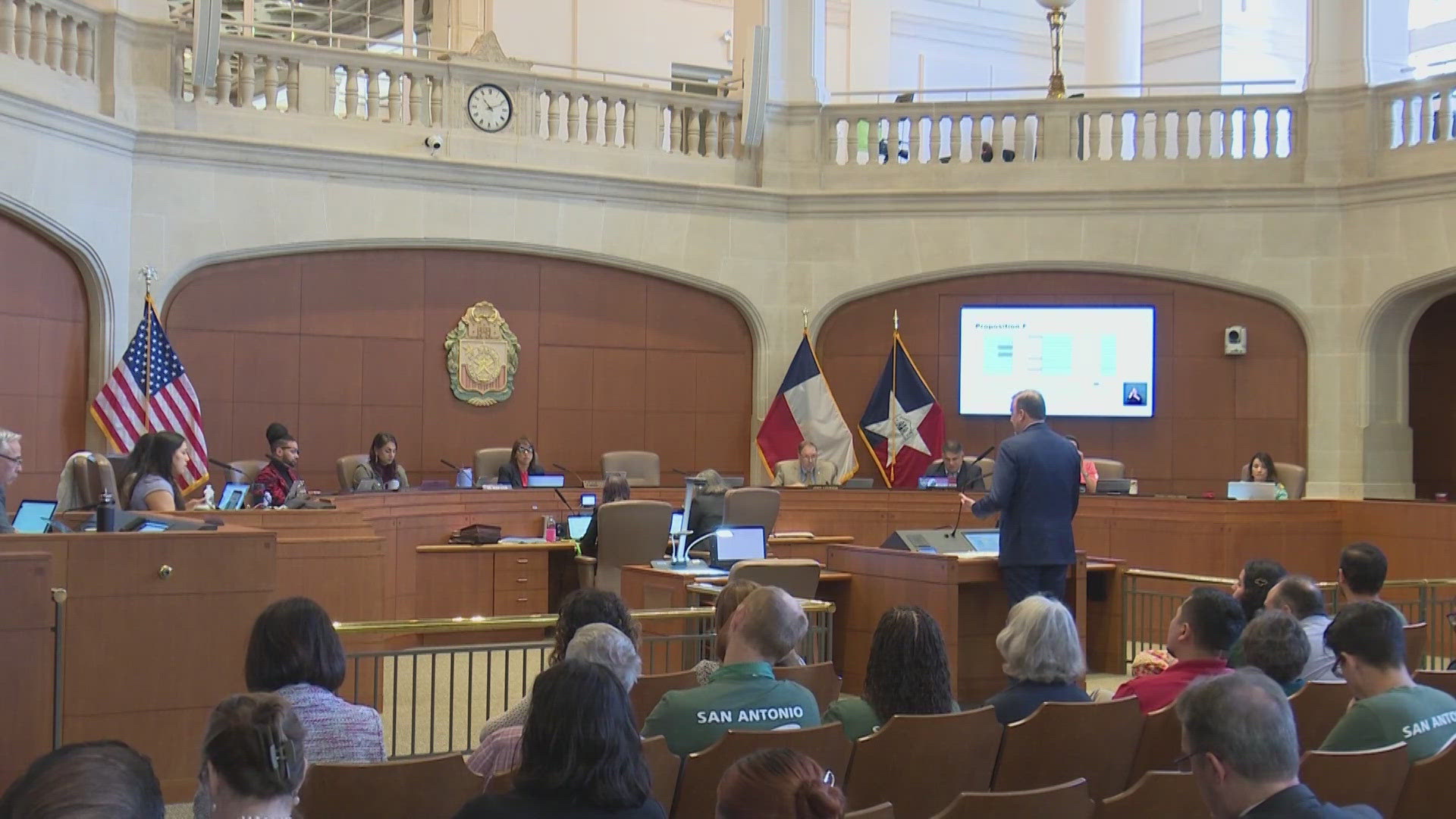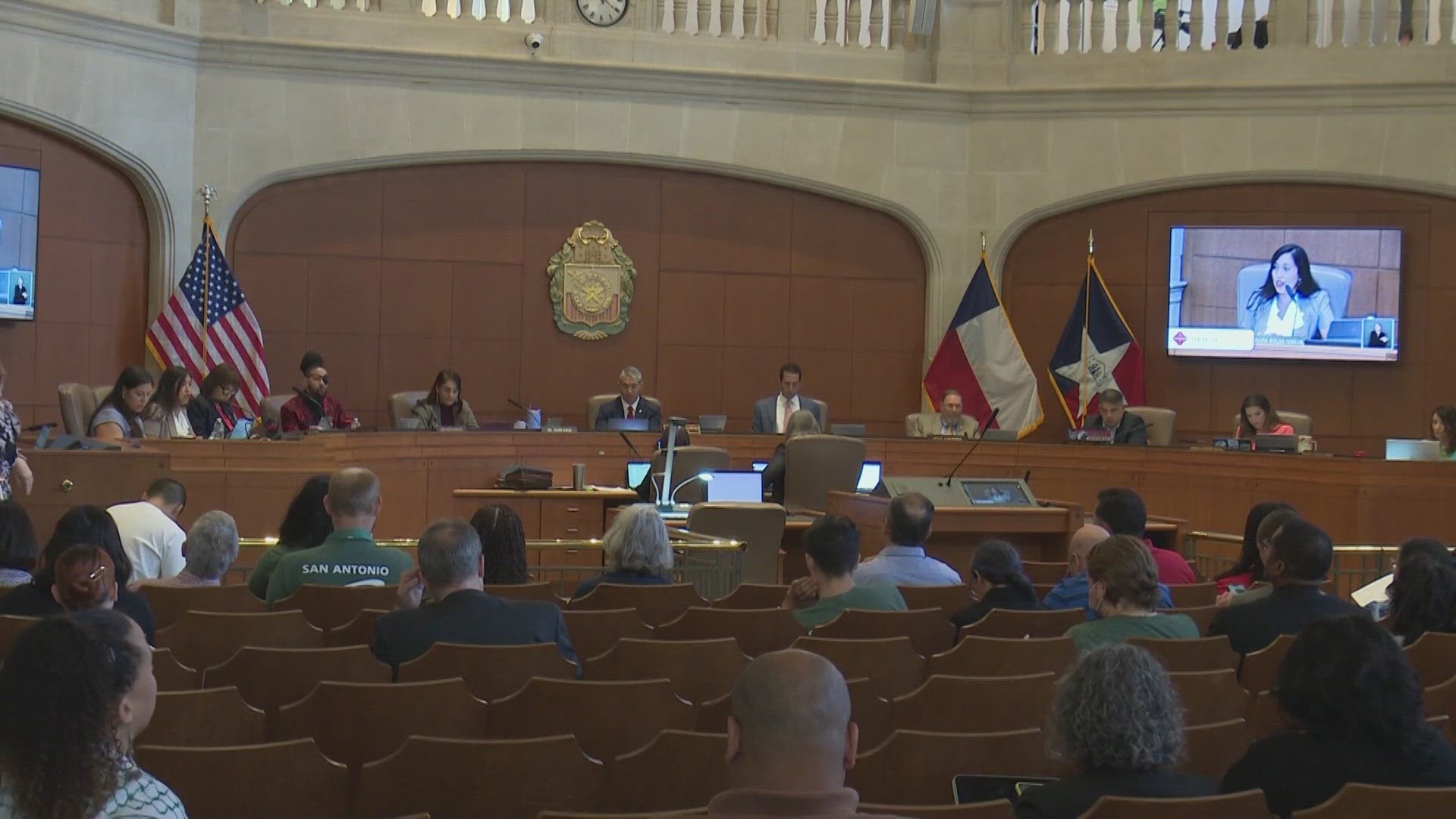SAN ANTONIO — After months of meetings by the Charter Review Commission and some last-minute adjustments Thursday, San Antonio City Council voted to green-light proposals that would increase salaries for its members and the mayor, among other possible changes.
The initiatives now go before their constituents. San Antonio residents will vote in November whether the suggested charter amendment will go into effect or not. City Council OK'd the pay increase proposition 8-3, with representatives Melissa Cabello Havrda of District 6, Manny Pelaez of District 8 and Marc Whyte of District 10 voting against pay increases.
The salary changes, if approved by voters, would go into effect for City Council members elected next May.
"My position on charter pay is documented," said Pelaez, who has previously called the effort "tone-deaf" while many in the city continue to struggle financially. "I don't think it should be on this ballot."
The salary question will be presented to voters on the ballot as Proposition E. They'll also be asked to weigh in on five other possible charter changes, including Proposition C, which gives City Council the power to set the city manager's pay and tenure.
Members of City Council currently make $45,000 and the mayor makes $58,000, salaries which have remain unchanged since 2015. If voters approve the raises – which will be presented on the ballot as Proposition E – the 10 City Council members would make $70,200 a year while the mayor, who is also a voting member of the body, would make $87,800.
Mayor Ron Nirenberg, who will depart the term-limited seat next summer, chalked the charter amendment up to allowing more people to consider running for council.
"I will tell you that the cost of not doing this is the fact that people who we want to see who are not career politicians – who are average neighbors with perspectives that are important to represent the community – in some cases will never be able to serve," he said.
The Charter Review Commission based the salary increases on the national average of income for a four-person household, as determined by the Department of Housing and Urban Development. Current income levels are set at 2014's median income level, according to Nirenberg.
District 9 City Councilman John Courage said he considered his council post a full-time job, adding: "It should be." He said increasing compensation would make things more flexible for those in city leadership positions.
If Proposition E passes, City Council members and the mayor will have the option to reject part or all of their salary. It would also cost taxpayers more, to the tune of an additional $270,000.
Cabello Havrda, a likely mayoral contender for 2025, said that while she supported some charter proposals, she didn't believe the public's voice was property considered and called the process "a missed opportunity."
“We fell short of our future because it didn’t include the public," she said Thursday. "We fell short as members of this community because we know that San Antonio deserves better.”
Election day is Nov. 5.
What else will voters consider?
Proposition E impacting City Council pay, while perhaps the most high-interest question approved by council on Thursday, is just one of six voters will weigh in on this November. So what would the others change, if passed?
Proposition A affects ethics, and would amend the charter to add a definition for "conflict of interest. It would also allows the Ethics Review Board the power to either accept or pass over ethics complaints against council members that have already been "resolved by an entity" other than the board.
Proposition B would tweak the city charter's language to "account for outdated and superseded provisions."
Proposition C allows City Council to set the pay and employment timeline for the city manager position. Currently, city managers like Erik Walsh can serve no more than eight years; a Charter Review Commission subcommittee voted to remove that cap.
Proposition D would allow San Antonio city workers to "participate in local political activity" so long as they're not violating state or federal law. It also protects those employees "against political retribution."
Finally, Proposition F tweaks term durations for both City Council and the mayor. It was approved by an 8-3 vote, with Pelaez, Whyte and Marina Alderete Gavito rejecting it.
City Council positions currently serve two-year terms, and no more than four.
"I still believe in two years," Alderete Gavito said. "This makes us more accountable to residents. This gives the residents the ability to hire or fire us."
If passed, they would instead serve four-year terms and can serve no more than two. The change keeps the maximum tenure of eight years intact, but lengthens individual terms.
"One year might be too much for council members who don't do the job," Nirenberg said. "And there is the opportunity, as there always will be, to remove council members who are not doing their jobs. That is something that is sacred. It doesn't change."
Many current City Council members highlighted that, under current term durations, by the time they start working on projects they've proposed, it's time to start campaigning again.
"The first two years is barely enough to understand how you can be responsible as a council member and how things work," said Courage. "And if you're campaigning the last five or six months of the first two years, you're very limited in what you can do."
The biggest change would be for any current council member who gets re-elected. If they hit eight years before their new term is up, there would be a special election to find a new council member who would finish out the remaining years.


